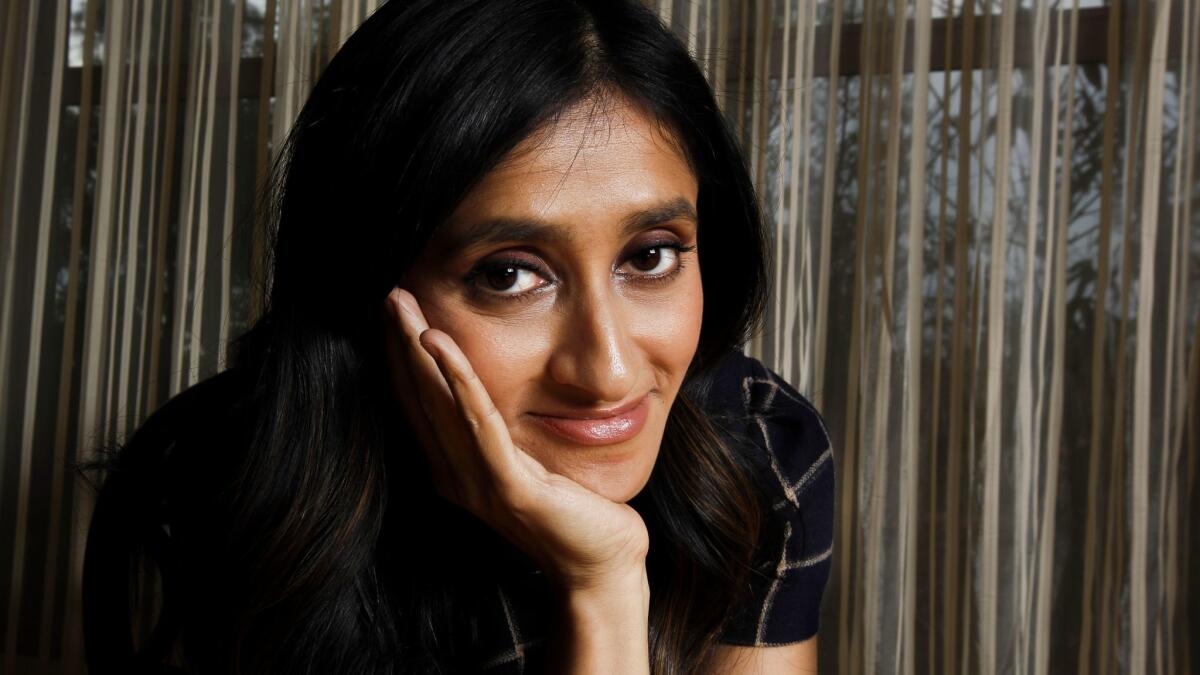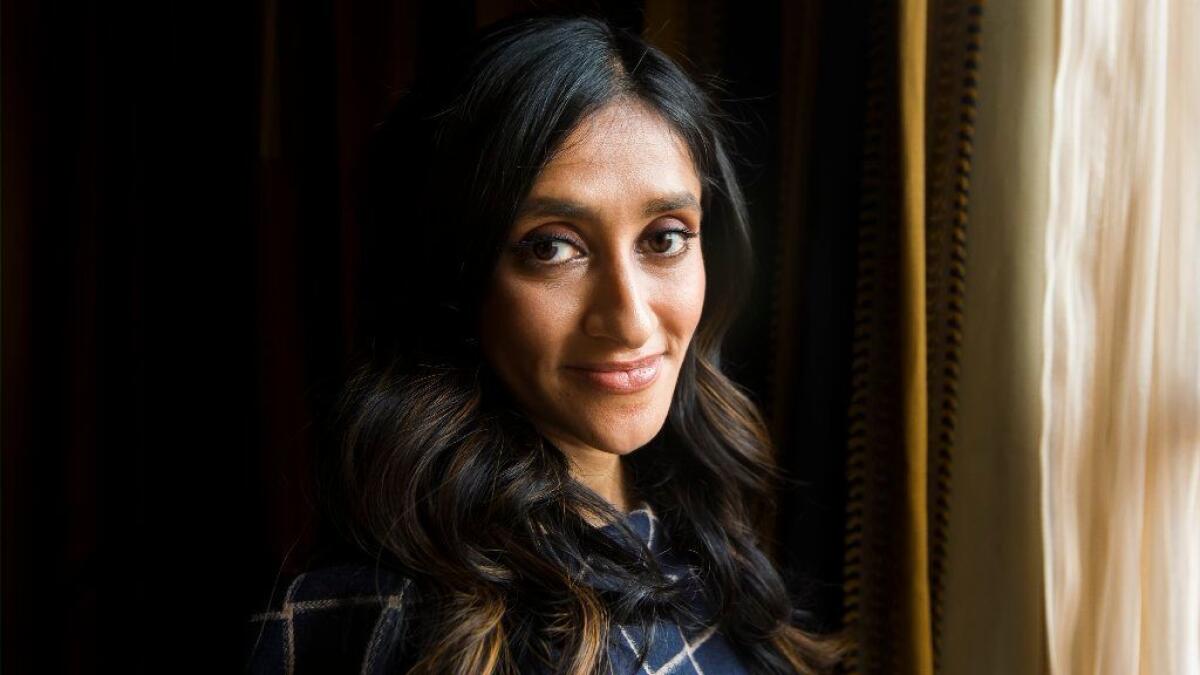Sunday Conversation: In stand-up and Comedy Central’s ‘Corporate,’ Aparna Nancherla is a rising comic force

Seated at a booth in a brightly lighted Hollywood coffee shop, Aparna Nancherla doesn’t have the usual bearing of a comedy scene-stealer. Cheerful and direct where her stand-up delivery is often dry with lethally funny flashes of absurdity while examining her issues with depression and anxiety, the 35-year-old Nancherla is a formidable figure in discerning comedy circles.
The daughter of Indian immigrants who was raised in Washington, D.C., but now lives in New York, Nancherla has a well-earned reputation as one of the funniest voices on Twitter. She has recently been seen on Netflix’s “Master of None” as well as being heard on the podcasts “2 Dope Queens” and a show that offered a sort of comic spin on living with depression, “Blue Woman Group,” which she co-hosted with fellow comic Jacqueline Novak.
For the record:
12:15 p.m. Feb. 2, 2018An earlier version of this story misstated Nancherla’s age as 36.
This year, in addition to continuing to appear in the second season of HBO’s “Crashing” (and one of the network’s upcoming “2 Dope Queens” specials), Nancherla began her biggest role yet with Comedy Central’s “Corporate,” which was created by two of her friends from the L.A. comedy scene, Matt Ingebretson and Jake Weisman. In it, she portrays Grace, the jaded head of HR at a soul-crushing mega-corporation. In one episode, she delivers an existential PowerPoint presentation on how her fellow employees “deal with the pain of being alive” (it’s far funnier than it sounds).
“I think a lot of lines on this show are things that you think but wouldn’t say, but everyone is just saying them,” she said with a laugh. “I guess this is a world where everyone just says the undertone of what they meant.”
Back in L.A., where she once lived and still occasionally performs, Nancherla talks more about “Corporate” and navigating comedy and reality in the age of Trump.
Did you have any office jobs like in “Corporate”?
The day job I had the longest was I worked at like a trade magazine in D.C. It was weird, it was kind of a meta-job because it was this magazine that studied how companies train their employees to be more productive and engaged. So it was kind of about work, it was a magazine about workplaces. Then when I moved out here I temped at NBCUniversal for a while.
Was there a different sort of corporate culture you noticed at these jobs?
I think NBC was probably the biggest corporation I worked for in an office-worker capacity. You get emails that are like, “This is our new policy on this,” and you’re like, “Who makes this decision? Where does it come from?” Then there would be events like we’d all go and celebrate something that was apparently big about the company that day – it just felt like everything filtered down. I feel like the show does a good job capturing how surreal and otherworldly it can be.
Were you able to draw from the places you worked for this show?
I’ve always struggled in an office atmosphere, I get very antsy and restless. And I think I also have trouble buying into the culture of it because there is something taken away from everyone’s humanity, I think, but you’re supposed to buy into that and not maybe acknowledge the degree to which that’s happening? I think I had a lot of trouble with that contradiction.
Your character on the show works in human resources, which is its own heightened reality.
I know, HR is supposed to be for your employees’ interests but I feel like a lot of times it comes across as sinister because someone’s like, “HR wants to see you.” And you’re always like, “Oh, I’m losing my job.”
And this is more for me in a way, but where did you guys film the office scenes?
We did them in the L.A. Times building. (Laughs.)
I thought so!
You were like, “Why am I having PTSD flashbacks?”
One of your episodes of “Blue Woman Group” was oddly enough about managing depression in an office.
I think [Jacqueline Novak and myself] both have had office jobs and realized how bad the combination of having a brain that skews depressive or anxious in those environments, because it feels like they’re set up to trigger a lot of things that your brain likes to go toward. I think they’re incubators for those tendencies.
You’re very honest about depression and anxiety in your comedy. Did that evolve while you were performing?
I think I had been struggling with a particularly bad rut of depression and anxiety and was having trouble really creating anything. So I kind of started writing about it by virtue of the fact that I wasn’t able to write about anything else. I think I just tried it onstage because I was like, this was all I’ve written recently, and I think it struck a chord with people in a way that I wasn’t expecting.
I first heard of you on Twitter, which has been a great medium for comics. But it seems like it’s changed a bit in the last year or so.
I think specifically post-election it’s become both a tool for people to feel maybe empowered in some ways of speaking out against what’s happening, but also the reverse side of that is in some ways it’s become a very toxic place where it’s very polarized. It’s like if you’re not on my side you’re on the other side, and every issue is very black and white and people are mad before they even read what they’re mad about.
Before I think it was a very valuable place where people would connect and disagree and people would learn about things. The internet has always had extremes of positives and negative, but I think it’s become more heightened since the election.
You kind of have to be on Twitter for your job -- is it a tough place to spend a lot of time?
I get frustrated with it a lot because I worry about falling into that whole “slacktivism” thing of “oh I retweeted today, I did my part.” That doesn’t feel like I did anything.
I feel like social media is such a bizarre version of reality where you think it’s reflecting exactly who’s out there and it could just be an algorithm that pushed up a bunch of trolls or bots. I think it can play with your mind so I try to have a relationship with Twitter where I’ll put stuff out but then I won’t spend all day checking reactions or I’ll scroll a little and read a few things but then I’ll be like “OK, that’s all.” It’s hard sometimes but I think it’s better than getting immersed too deeply because it feels like it can clog your brain very quickly.

Your comedy album “Just Putting It Out There” from 2016 didn’t touch on much political material. Are you doing more of that now?
It’s interesting because my first jobs in TV, my first one was “Totally Biased [With W. Kamau Bell]” on FX, and that was definitely more politically minded and social justice-oriented. Then the next late night show I worked on was Seth Meyers’, which was also more politically minded. I feel like my jobs have always been more politically inclined and then my stand-up caught up to that later by virtue of the climate that we’re in now.
But I still try to speak to it from the same place of, how does this show up in my day-to-day life. I have a joke where it’s like, “I’m really bad at calling my representatives because I’m an introvert and I don’t like talking to strangers on the phone.”
Do you feel an additional obligation to be outspoken as a woman of color and a child of immigrants?
Yeah, I think in that sense I’m more politically outspoken on social media about certain issues that I feel strongly about. But to me I still haven’t quite figured out how to bring some of that into my stand-up. Because then the trick is making it funny and not just making people angry or bummed out about it. It’s trying to find that angle to approach it.
What do you watch right now to escape?
It’s strange because as a comedian, watching comedy sometimes feels too close to work because it’ll be either like seeing people I know or trying to analyze the show from a technical perspective.
I actually skew more to dark stuff like true crime and stuff that’s a lot farther away. I just started the Errol Morris documentary on Netflix “Wormwood.” It’s really good – it’s pretty dark and it’s interesting because it splices these interviews with his main source with dramatic reenactments with very high-quality actors like Peter Sarsgaard. It’s almost like a very well done “Investigation Discovery” or something.
Follow me over here @chrisbarton.
ALSO:
Overrated/Underrated: ‘The End of the ... World,’ and enough with the ‘Oprah 2020’ talk
Review: Black Mirror’ returns with more grim looks at the future
Sarah Silverman on leaving her bubble for ‘I Love You, America’
More to Read
The complete guide to home viewing
Get Screen Gab for everything about the TV shows and streaming movies everyone’s talking about.
You may occasionally receive promotional content from the Los Angeles Times.







